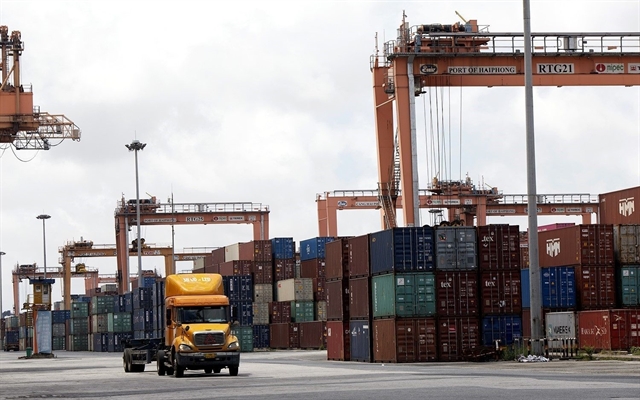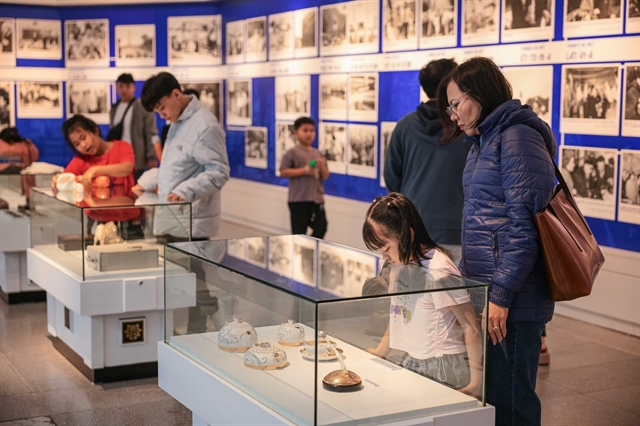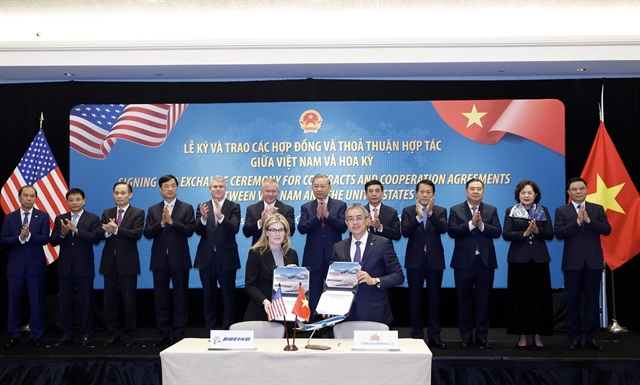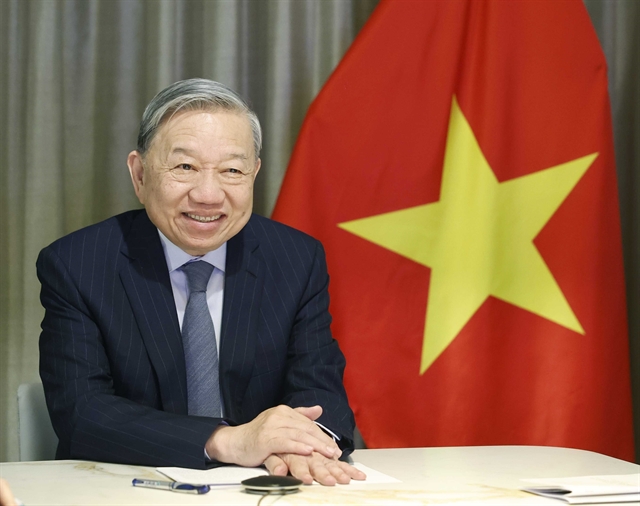 Politics & Law
Politics & Law

April 30, 1975 is a glorious landmark in Vietnamese history — the end of a prolonged and bloody war, and the beginning of national reunification and development. The event resonated far beyond Việt Nam’s borders, symbolising the triumph of national unity, resilience, and self-determination over foreign domination.
Half a century later, the significance of this victory remains deeply etched in global memory. On the 50th anniversary of the Liberation of the South and National Reunification, foreign journalists, scholars and witnesses have shared their reflections — not only on the historic day itself, but also on Việt Nam’s extraordinary journey of recovery, development and global integration.
A French journalist’s perspective
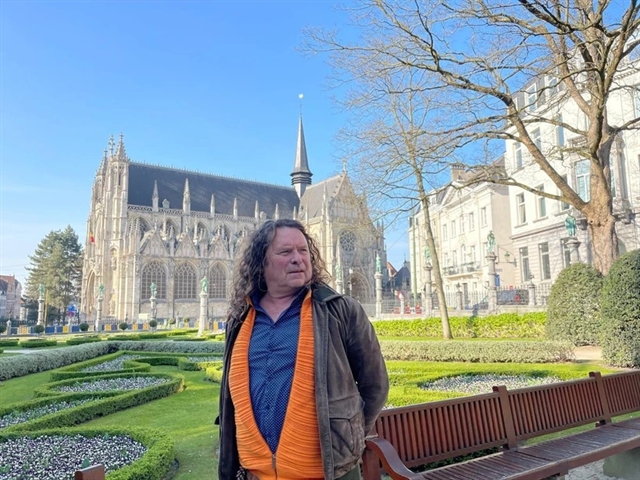 |
| INSPIRED: For French journalist Alain Thomas, Việt Nam is living proof that a small nation can defeat seemingly invincible forces and is now firmly on the path to becoming an Asian economic powerhouse. Photo Hương Giang |
For French journalist Alain Thomas, April 30, 1975 is not only a historical milestone but also an "iconic image” — that of a tank crashing through the gate of the Independence Palace.
“Việt Nam is living proof that a small nation can defeat seemingly invincible forces and is now firmly on the path to becoming an Asian economic powerhouse,” he said.
That moment, he said, marked the end of decades of foreign domination, from French colonialism to American imperialism, and the full realisation of the independence declared in 1945 by President Hồ Chí Minh.
“It was when the Vietnamese people took control of their own political and economic destiny,” he added.
He likened Việt Nam’s struggle to a real-life version of the David and Goliath legend, where willpower overcame superior military might.
Having visited Việt Nam since the early 2000s, Thomas said he had been struck by the country’s transformation — from a largely rural society to “one of Asia’s economic dragons”. He pointed to the rise of the middle class, improved living standards, and a vibrant real estate market.
He also praised the nation’s emphasis on education: “Seriousness, diligence, and discipline in learning and working are key factors enabling Việt Nam to thrive in the 4.0 era.”
Thomas commended the country’s political and social stability, saying: “The resilience and solidarity that helped defeat foreign powers continues to propel Việt Nam forward.”
Indomitable spirit: Cuban reporter
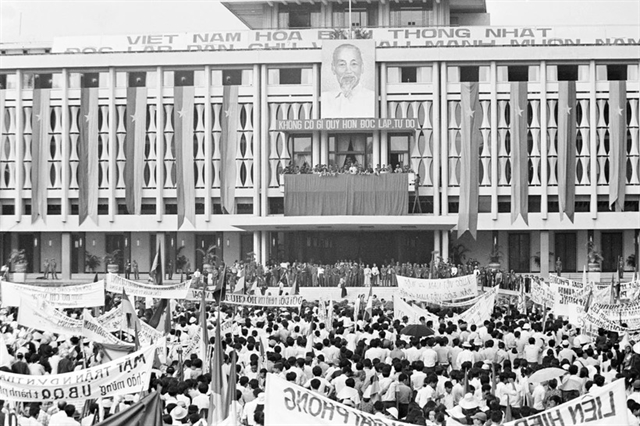 |
| RALLY: People of Sài Gòn welcome the launch of the city's new administration on May 7, 1975. Photo Lâm Hồng Long |
Cuban correspondent Luis Arce, who witnessed the event of April 30, 1975, described it as one of modern history’s defining milestones.
“The victory was not only the fulfilment of President Hồ Chí Minh’s dream of national reunification, but also a profound affirmation: ‘The country of Việt Nam is one, the Vietnamese nation is one. Rivers may dry up, mountains may wear away, but that truth will never change.’”
He said the moment transcended borders and eras, proving that even the most powerful empires could not defeat a patriotic and united nation.
“It was the military victory of a predominantly peasant nation over the mightiest empire in the world, which broke the arrogance of imperialism and upheld the indomitable spirit of the Vietnamese,” he said.
He recalled scenes of emotional reunions between families separated for decades — “moments of indescribable emotion” that reaffirmed the unity of the Vietnamese nation, contrary to how the American media had portrayed it.
That spirit of unity, he said, remained central today. “It continues to drive Việt Nam’s modernisation and its efforts to improve the material and spiritual well-being of its people.”
The diplomatic victory
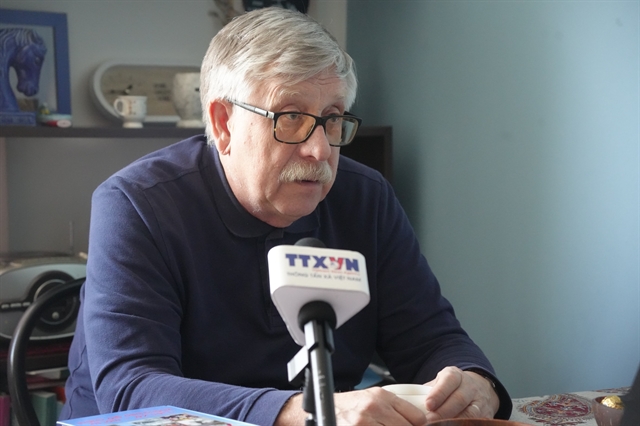 |
| DIPLOMATIC VICTORY: Petr Tsvetov, PhD, from the Diplomatic Academy of the Russian Ministry of Foreign Affairs grants an interview to a Vietnam News Agency correspondent in Russia on the 50th anniversary of the Liberation of the South and National Reunification. Photo Quang Vinh |
Petr Tsvetov, PhD, from the Diplomatic Academy of the Russian Ministry of Foreign Affairs, and vice president of the Russia-Việt Nam Friendship Association, highlighted the importance of diplomacy in Việt Nam’s victory.
The then Soviet Union supported Việt Nam’s “fight while negotiating” strategy — from military aid to political and diplomatic backing. Soviet leaders consistently advocated for reunification, rejecting proposals for a permanent division.
At the Paris Peace Talks, the Soviets supported Việt Nam’s negotiators, especially Lê Đức Thọ, whose prolonged talks with US Secretary of State Henry Kissinger led to the signing of the Paris Peace Accords.
Tsvetov praised Việt Nam’s ability to maintain balanced relations with major powers — a hallmark of its foreign policy that endures today.
'Changes are striking'
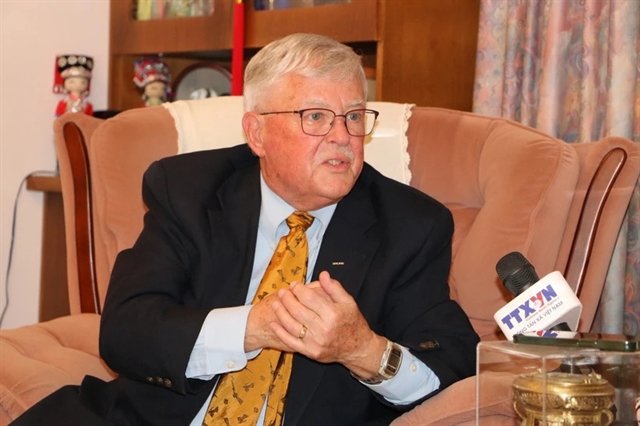 |
| STRIKING CHANGES: Professor Carl Thayer, from the Australian Defense Force Academy (University of New South Wales, Australia) in a conversation with a VNA reporter in Australia. Photo Lê Đạt |
Professor Carl Thayer from the Australian Defence Force Academy hailed Việt Nam’s transformation from a war-torn nation to a regional economic power.
Each time he returns to the “S-shaped land”, he said, the "changes are striking".
The first 15 years after reunification were particularly tough, marked by border conflicts and the US embargo. “But Việt Nam’s leaders showed vision, embracing reforms and opening up to the world,” he said.
The year 1995 was a turning point: diplomatic normalisation with the US and accession to ASEAN opened the door to foreign investment and a shift from agriculture to manufacturing.
Thayer said national unity was the foundation of the April 30 victory — and continued to underpin the country’s development.
He praised the Việt Nam People’s Army for defending sovereignty, and highlighted Việt Nam’s active role in international forums like APEC, ASEAN, and the WTO.
“Most developing nations look at Việt Nam with admiration,” he said, noting its two terms as a non-permanent member of the UN Security Council.
'Contemporary epic'
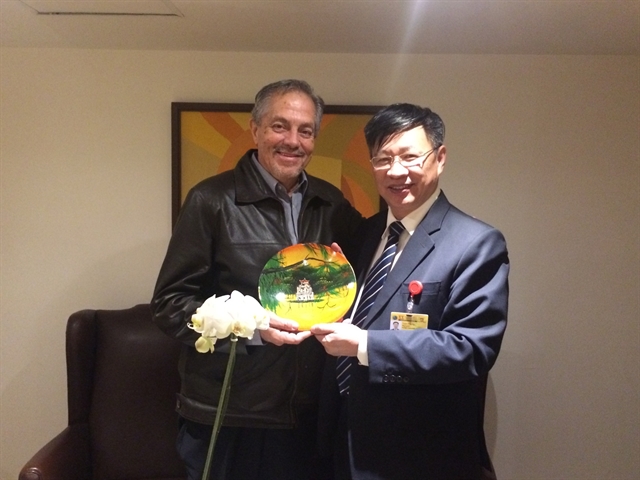 |
| WARM TIES: Juan Meriguet Martínez, member of Ecuador’s Citizens Revolution Central Committee (left) with Nguyễn Tuấn Phong, then deputy head of the Vietnam Communist Party Central Committee’s Commission for External Relations. VNA Photo |
Juan Meriguet Martínez, member of Ecuador's Citizens Revolution Central Committee, described Việt Nam’s victory as “a contemporary epic” that inspired anti-colonial and national liberation movements worldwide.
He said the triumph affirmed every nation’s right to choose its own political system and development path.
Martínez said Ecuadorians in the 1960s and 70s followed news from Việt Nam closely, organising protests and cultural events in solidarity.
His father, French-born revolutionary Raymond Meriguet, was inspired by Hồ Chí Minh’s writings. His mother, Nela Martínez, campaigned to raise awareness of Việt Nam’s struggle and denounce war crimes.
“The spirit of solidarity and resistance that defined Việt Nam’s past victories continues to inspire generations — not just in Southeast Asia, but around the world,” he said.
Fifty years after the liberation army tanks rolled through the gates of the Independence Palace, Việt Nam stands as a symbol of what a united and determined nation can achieve. "From a war-ravaged land to a rising regional power, its story is one of reconciliation, dignity and growth," he said. VNS

